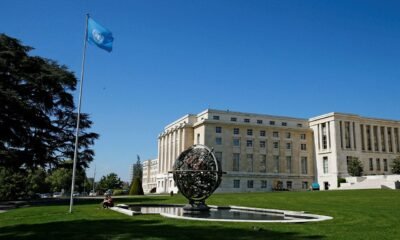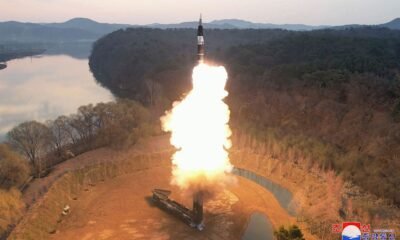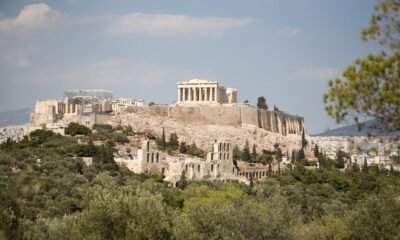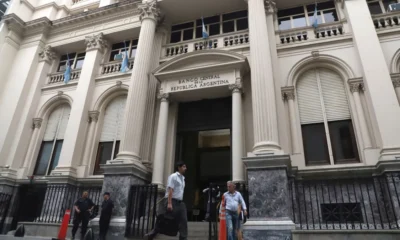INTERNACIONAL
Greece proposes 2 marine parks as part of $830M environmental protection program

- Greece plans to establish two large marine parks aiming to safeguard biodiversity and marine ecosystems.
- Prime Minister Kyriakos Mitsotakis said the expansion of marine protected areas by 80 percent will involve banning harmful fishing practices and implementing new monitoring technologies.
- Greece intends to build marine parks in the Ionian and Aegean Seas, covering over 30 percent of its waters.
Greece aims to create two large marine parks as part of an $830 million program to protect biodiversity and marine ecosystems, with the plans to be formally announced at an international oceans conference starting in Athens Tuesday.
But the plan has irked Greece’s neighbor and regional rival, Turkey, while environmental organizations say the initiative doesn’t go far enough, noting that the country also allows environmentally harmful practices such as energy exploration in sensitive marine environments.
«We are increasing the size of our marine protected areas by 80%, banning harmful fishing practices and using new technologies to monitor and enforce the commitments we make here,» Prime Minister Kyriakos Mitsotakis said ahead of the conference.
IS THIS TECHNOLOGY THE ANSWER TO CLEANING UP OUR OCEAN’S PLASTIC PROBLEM?
The two-day international meeting being held in Athens aims «to catalyze global action against two overlapping crises, the climate crisis and the crisis of our ocean,» Mitsotakis said. «Countries have come with specific proposals to take decisive action.»
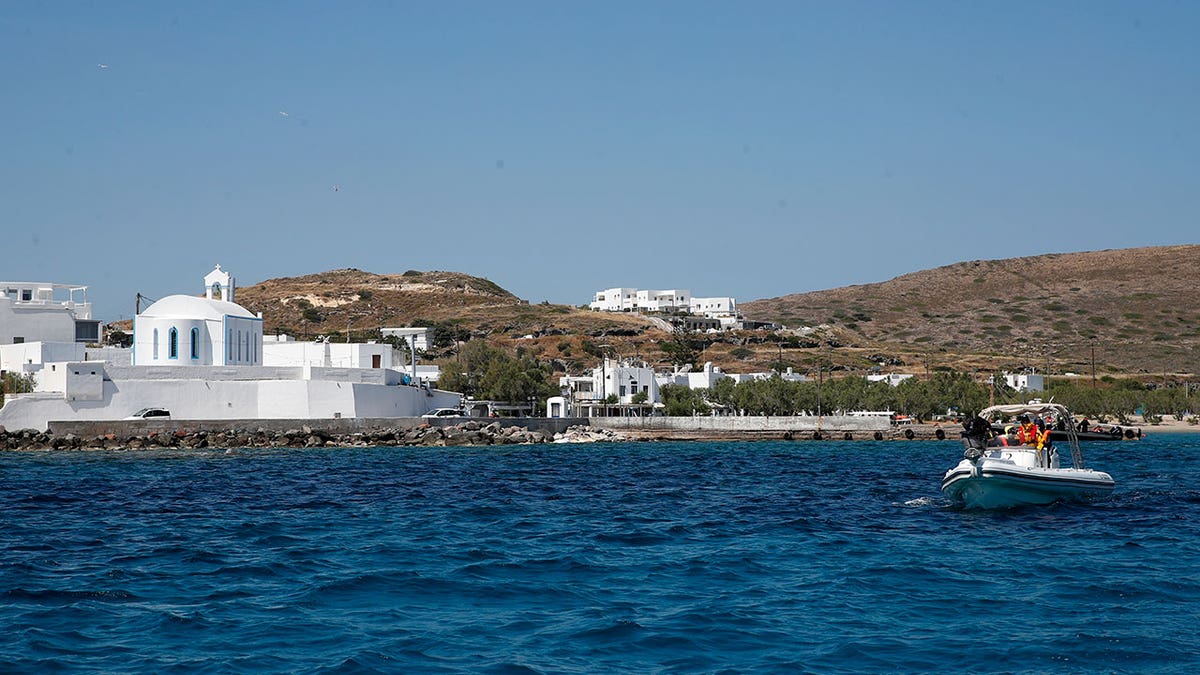
Medical staff in a dinghy are seen in a boat near the Aegean Sea island of Milos to Sikinos island, Greece. Greece aims to create two large marine parks as part of a $830 million to protect biodiversity and marine ecosystems, with the plans to be formally announced at an international oceans conference starting in Athens on Tuesday. (AP Photo/Thanassis Stavrakis, File)
With thousands of islands and islets and one of the longest coastlines in the Mediterranean, Greece has said it will create one new marine park in the Ionian Sea and one in the Aegean Sea, bringing the total area of marine protected areas to over 30% of its waters.
But environmental organizations have called for stronger commitments to environmental protection.
Under a slogan of «The sea is not for sale,» Greenpeace urged leaders attending the Our Ocean Conference in Athens to take concrete measures to protect the world’s marine environment.
CORAL REEFS AROUND THE WORLD ARE EXPERIENCING MASS BLEACHING IN WARMING OCEANS, SCIENTISTS SAY
The conference «must not be simply an opportunity for governments to congratulate themselves for what they have said until now,» said Nikos Charalambidis, head of Greenpeace in Greece. «On the contrary, this must be where serious steps and action plans are presented to prevent the looting of our seas.»
Greenpeace, the World Wildlife Fund and other organizations have leveled particular criticism at Greece for allowing deep-sea seismic exploration for energy and mineral resources in the Hellenic Trench, which includes the deepest waters in the Mediterranean at more than 5,200 meters (17,300 feet).
The trench, which stretches from southwestern Greece to Crete, is a vital habitat for the Mediterranean’s few hundred sperm whales and for other marine mammals already threatened by fishing, ship collisions and plastic pollution.
Asked whether the Greek government planned to extend protection to the entirety of the Hellenic Trench, Theodoros Skylakakis, Greece’s minister for both the environment and energy, stressed that adapting to a green economy requires significant funds over the coming decades.
«We need to be a lot more efficient in everything we do. And not trigger our reaction by ideology but rather trigger it by science, by efficiency and by investment,» Skylakakis said. «And for that, we will need money. If anybody thinks we can meet this challenge of paying for the adaptation … and at the same time don’t have economic growth, they don’t live in this world.»
CLICK HERE TO GET THE FOX NEWS APP
Greece’s plan for the two marine parks has also irked its neighbor and regional rival Turkey. When the plan was initially aired last week, Turkey’s foreign ministry accused Athens of exploiting environmental issues to push its geopolitical agenda. The two countries, both NATO members, have been at odds for decades over a series of issues, including territorial claims in the Aegean, and have reached the brink of war three times in the last 50 years.
Relations have improved somewhat over the past year following a period of heightened tensions that saw the two countries’ warships facing off in the eastern Mediterranean. But Ankara responded with annoyance to the plan for a marine park in the Agean.
«It is known that Greece has long been trying to benefit from almost every platform in the context of Aegean problems,» the Turkish Foreign Ministry said. «Despite the recent softening in our relations, it appears that Greece is exploiting environmental issues this time.»
Greece’s foreign ministry retorted that Ankara was «politicizing a clearly environmental issue.»
INTERNACIONAL
Elecciones en Francia: quién es Jean-Luc Mélenchon, el polémico líder de la izquierda que dio el batacazo

Cuatro días después de que Emmanuel Macron convocara a elecciones anticipadas tras los malos resultados en el parlamento europeo, un grupo de partidos se unieron y formaron el Nuevo Frente Popular, una coalición destinada a resucitar el Frente Popular que llegó al poder en 1936 para frenar a la extrema derecha, y que promulgó políticas sociales que incluían semanas laborales de 40 horas y licencias remuneradas para los trabajadores.
La amplia –y potencialmente rebelde– alianza estaba encabezada por Jean-Luc Mélenchon, tres veces candidato presidencial (en 2012, 2017 y 2022, mejorando los resultados de cada elección con respecto a la anterior) y líder del partido Francia Insumisa. A él se han sumado los socialistas, los comunistas, los Verdes, y la Place Publique, encabezada por el popular miembro del Parlamento Europeo (MEP) Raphaël Glucksmann.
Y la estrategia parece haber funcionado. En la primera ronda electoral el Nuevo Frente Popular quedó en segundo lugar tras Agrupación Nacional (RN) de la extrema derecha y por delante del actual partido mayoritario del presidente Emmanuel Macron. Y ahora dio el batacazo.
Mélenchon, de 72 años, lleva décadas en la escena política francesa, en las que ha perfeccionando su lírica forma de hablar, mientras abraza sin concesiones las ideas de la izquierda. En el pasado, cuando era miembro del Partido Socialista, ocupó cargos ministeriales en gobiernos anteriores.
De acuerdo a su propia biografía, Mélenchon nació en Tánger, Marruecos, en 1951, y es licenciado en Filosofía y Letras Modernas. Como activista socialista, se convirtió en el senador más joven de Francia en 1986. También es autor de 19 libros, entre los cuales se destaca «La era del pueblo», donde expone su teoría de la revolución ciudadana, indica su sitio web.
Desde las elecciones de 2017, el principal catalizador para el rápido ascenso de Mélenchon parecen haber sido sus actuaciones en los debates presidenciales, donde se destacó por la combinación de ingenio, conversación fácil y su sencilla forma de hablar.
Incluso quienes no están de acuerdo con sus puntos de vista, les gusta ver su desempeño en los debates.
En efecto, Mélenchon es una de las figuras más divisivas de la política francesa, que entusiasma y horroriza a los votantes con sus desenfrenadas propuestas de impuestos y gastos, su retórica sobre la lucha de clases y sus posiciones controvertidas en materia de política exterior, especialmente en Gaza, sus críticos lo acusan de antisemitismo, lo que él niega.
Hasta el año 2012, cuando la ola populista aún no había afectado a Europa, Mélenchon era un candidato marginal, pero el paisaje ha cambiado radicalmente desde entonces. Por eso, incluso en un contexto diferente, el candidato se ha hecho popular entre los votantes más jóvenes, se ha destacado en redes sociales y tiene un famoso canal de YouTube.
El es un «Viejo Insumiso» reciclado, desde senador y ministro del Partido Socialista, a rebelde enojado de la izquierda de la izquierda, para ahora representar “al pueblo”. Neopopulismo post Trump de un tribuno excelso, con inigualable oratoria, admirador de Hugo Chávez, Cristina Kirchner y la revolución Bolivariana.
Mélenchon era un senador socialista y trotskista como el ex primer ministro Lionel Jospin. Un verdadero intelectual, que hace de la conversación y la poesía un placer de la vida. Con una abuela andaluza, con un español perfecto, este ex ministro de Educación de la enseñanza superior descubrió el neo populismo chavista y kirchnerista y se enamoró de él. ¿Nostalgia de Mayo del 68? ¿Por qué no? Tuvo inspiración en el argentino Ernesto Laclau y su guía ideológica su esposa, la politóloga y escritora belga, Chantal Mouffe.
Mélenchon es anti europeo pero diferente a Le Pen. Propone salir de los tratados de Europa para reformarlos. Para conseguirlos, promete un duro tour de force con la canciller alemana Ángela Merkel. Piensa sacar a Francia de la OTAN y con su contrincante Marine Le Pen tienen un punto en común, su profunda admiración por el presidente ruso Vladimir Putin.
-
POLITICA3 días ago
Tras romper con Macri, Patricia Bullrich negó su salida del PRO: “Ni loca me voy, nos quedamos”
-
POLITICA1 día ago
Detuvieron a un hombre armado a metros del acto de Milei en San Juan
-
ECONOMIA3 días ago
La inflación de junio rondaría el 5,2% según los analistas consultados por el Banco Central
-
SOCIEDAD3 días ago
Caso Loan: Camila declaró por más de cinco horas y al salir pidió que encuentren al nene
-
POLITICA2 días ago
El Gobierno busca bajar la tensión con el PRO y dice que cumplirá el fallo por la coparticipación a la Ciudad que reclamó Macri
-
POLITICA3 días ago
Federico Sturzenegger es el nuevo ministro de Desregulación y Transformación del Estado



